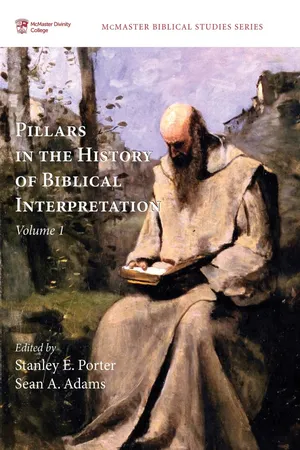![]()
Contributors to Volume 1
Sean A. Adams is Lecturer in New Testament and Ancient Culture at the University of Glasgow, UK. He has written widely on the relationship between the New Testament and Greek literature and is the author of The Genre of Acts and Collected Biography and Baruch and the Epistle of Jeremiah.
Philip D. Burggraff is Teaching Pastor at Clearwater Community Church in Dunedin, FL, and formerly Associate Professor of Bible and Biblical Languages at Clearwater Christian College.
Brandon D. Crowe is Associate Professor of New Testament at Westminster Theological Seminary in Philadelphia, PA. He has published on a variety of topics relating to the history and theology of the New Testament and early Christianity, including The Obedient Son: Deuteronomy and Christology in the Gospel of Matthew.
James D. Dvorak is Associate Professor of Greek and New Testament at Oklahoma Christian University. He is co-editor of Baptism: Historical, Theological, and Pastoral Perspectives (with Gordon L. Heath) and The New Testament Church: The Challenge of Developing Ecclesiologies (with John Harrison).
Paul Foster is Professor of New Testament and Early Christianity in the School of Divinity at the University of Edinburgh, UK. He has published widely on the Gospels, including a critical edition and commentary on the Gospel of Peter. He has written extensively on the sayings source Q, and issues relating to the Synoptic problem.
William K. K. Kapahu is an adjunct professor and guest lecturer in Old Testament and Second Temple Judaism at New Hope Christian College, WA. He is studying for his PhD with a focus on unit delimitation within ancient biblical manuscripts.
Andreas Köstenberger is Senior Research Professor of New Testament and Biblical Theology at Southeastern Baptist Theological Seminary in Wake Forest, NC. He is the founder of Biblical Foundations™, the editor of the Journal of the Evangelical Theological Society, and the author or editor of numerous books, including Invitation to Biblical Interpretation.
Jae Hyun Lee is Chaplain at Handong Global University, Pohang, Korea. He is also the author of Paul’s Gospel in Romans: A Discourse Analysis of Romans 1:16—8:39.
Jan Nylund is a PhD student in New Testament exegesis at Lund University in Sweden. His research interests include New Testament language studies (specifically verbal aspect and discourse analysis), hermeneutics, and New Testament research history. He has been teaching and supervising since 2009 and has more than 25 publications.
Hughson T. Ong is Lecturer in New Testament and Managing Editor of McMaster Divinity College Press at McMaster Divinity College, Hamilton, ON, Canada. He has published numerous journal articles and essays on various New Testament topics, including linguistics and sociolinguistics, and is the author of The Multilingual Jesus and the Sociolinguistic World of the New Testament.
Ronald D. Peters is Professor of New Testament at Great Lakes Christian College, MI. His most significant publication is The Greek Article: A Functional Grammar of ὁ-Items in the Greek New Testament with Special Emphasis on the Greek Article.
Andrew W. Pitts is Assistant Professor of Biblical Studies at Arizona Christian University. He is the author (with Stanley E. Porter) of Fundamentals of New Testament Textual Criticism, and is an editor of Early Christianity in Its Hellenistic Context, an ongoing series of edited volumes focusing upon Christian Origins.
Stanley E. Porter is President, Dean, and Professor of New Testament, as well as holder of the Roy A. Hope Chair in Christian Worldview, at McMaster Divinity College, Hamilton, ON, Canada. He has written widely on most topics in New Testament studies, and has an interest in the history of interpretation. His latest books include Constantine Tischendorf: The Life and Work of a 19th Century Bible Hunter, Linguistic Analysis of the Greek New Testament, John, His Gospel, and Jesus, and The Book of Romans: A Linguistic and Literary Commentary.
Dieter T. Roth is Wissenschaftlicher Mitarbeiter (Post-Doctoral Fellow) at Johannes Gutenberg-Universität Mainz, Germany. He is the author of The Text of Marcion’s Gospel.
Daniel So is Associate Pastor at Grace Community Church, Surrey, BC, Canada.
Beth M. Stovell is Assistant Professor of Old Testament at Ambrose University in Calgary, AB, Canada. Beth has authored Mapping Metaphorical Discourse in the Fourth Gospel and Minor Prophets: Hosea-Micah and co-edited Biblical Hermeneutics: Five Views (with Stanley E. Porter).
![]()
Biblical Criticism before around 1980
An Overview of Volume One
Stanley E. Porter
This first volume of two volumes on major figures in biblical interpretation is concerned with biblical criticism before around 1980. The second volume focuses upon biblical criticism after that date. As a result, this volume contains essays about biblical interpreters who are associated with what might be characterized as “traditional” approaches to interpretation. Any attempt at characterizing approaches to biblical interpretation is bound to fail to be satisfactory, however, because of the complex and intertwined nature of such interpretation. The introduction to biblical interpretation in this volume attempts to chronicle in brief form how five major strands of intellectual development that were present at the beginning of the modern interpretive era have developed into most if not virtually all of the current approaches to biblical interpretation. As a result, this particular volume contains essays about major biblical interpreters who practiced approaches that came into widespread development and use during the period from the rise of historical criticism to around 1980. There is nothing special about the year 1980, however, apart from the fact that, when we examine the history o...
